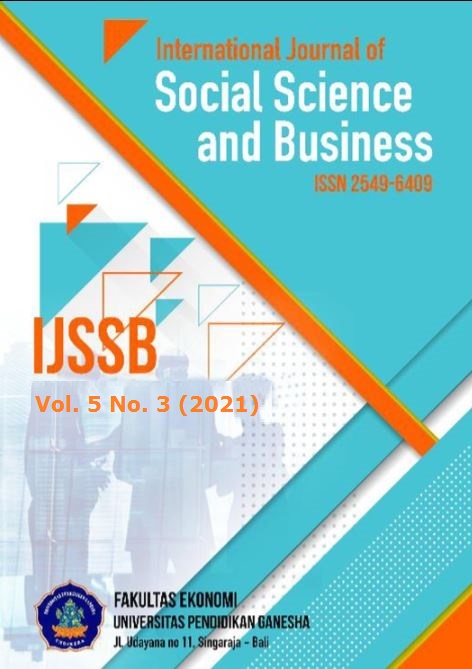The Influence of Work Discipline, Communication, and Work Conflict on Employees Performance at PT Pratama Makmur Jaya Medan
DOI:
https://doi.org/10.23887/ijssb.v5i3.35095Abstract
Conflicts usually arise in an organization as a result of the various problems in terms of communication, personal relationships or because of the problem of the structure of the organization. The conflict of work can also be interpreted as the behavior of the members of the organization that was devoted to the liberal opposition against the other members. Work conflicts that occur within the company due to the existence of a dispute occurs on the employee in connection with the work and most employees can't work together in the organization of the company. This study aims to examine and analyze the influence of work discipline, communication, and conflict to work on the performance of employees of PT Pratama Makmur Jaya Medan. This research was a descriptive quantitative with explanatory method. Analysis data in this study used multiple regression analysis. Sample collection techniques, namely simple random sampling. The research sample is 106 employees. The test results obtained that the Work discipline is partially positive and significant effect on employee performance at PT Pratama Makmur Jaya Medan. Communications in partial positive and significant effect on employee performance at PT Pratama Makmur Jaya Medan. The conflict partially has positive and significant effect on employee performance at PT Pratama Makmur Jaya Medan. The discipline of work, communication and conflict simultaneously positive and significant effect on employee performance at PT Pratama Makmur Jaya Medan.
References
Brown, T. J., & Dacin, P. A. (1997). The company and the product: Corporate associations and consumer product responses. Journal of Marketing, 61(1), 68–84. https://doi.org/10.1177%2F002224299706100106.
Chong, L. L., Ong, H. B., & Tan, S. H. (2018). Corporate risk-taking and performance in Malaysia: the effect of board composition, political connections and sustainability practices. Corporate Governance (Bingley), 18(4), 635–654. https://doi.org/10.1108/CG-05-2017-0095.
Da’as, R., & Zibenberg, A. (2021). Conflict, control and culture: implications for implicit followership and leadership theories. Educational Review, 73(2), 194–208. https://doi.org/10.1080/00131911.2019.1601614.
Darmawansyah. (2013). Penerapan Prinsip- prinsip Good Corporate Governance Terhadap Kepuasan Kerja dan Kinerja Karyawan. Jurnal AKK Indonesia, 2(2). http://journal.wima.ac.id/index.php/JIMA/article/view/244.
Dasuki, H. (2017). Pengaruh Corporate Rebranding Terhadap Loyalitas Konsumen PT. EIGER Melalui Brand Association dan Reputasi Perusahaan (Studi pada UKM Pencinta Alam di Bandar Lampung) [Universitas Negeri Lampung]. http://digilib.unila.ac.id/28228/.
Dharma, Y. (2018). The effect of work motivation on the employee performance with organization citizenship behavior as intervening variable at Bank Aceh Syariah. Proceedings of MICoMS 2017. https://doi.org/10.1108/978-1-78756-793-1-00065.
Gauche, C., Beer, L. T. de, & Brink, L. (2017). Managing employee well-being: A qualitative study exploring job and personal resources of at-risk employees. South African Journal of Human Resource Management, 15(1), 1–13. https://doi.org/10.4102/sajhrm.v15i0.957.
Ghozali, I. (2014). Ekonometrika: Teori, Konsep dan Aplikasi dengan IBM SPSS 22. Badan Penerbit Undip.
Harris, F., & de Chernatony, L. (2001). Corporate branding and corporate brand performance. European Journal of Marketing, 35(3/4), 441–456. https://doi.org/10.1108/03090560110382101.
Indajang, K., Lie, D., Efendi, E., & Wijaya, A. (2017). Pengaruh Budaya Organisasi Dan Komunikasi Terhadap Kinerja Karyawan Pada PT Bank Central Asia, Tbk. Cabang Pematangsiantar. Sultanist: Jurnal Manajemen Dan Keuangan, 6(2), 18–25. https://doi.org/10.37403/sultanist.v5i2.91.
Lie, D., Sherly, S., Dharma, E., & Sudirman, A. (2019). The Impact of Work Discipline and Work Ethic on the Teacher Performance of Sultan Agung Pematangsiantar Private Middle School Teachers T.A. 2018/2019. International Journal of Business Studies, 3(3), 125–135. https://doi.org/10.32924/ijbs.v3i3.83.
Othman, A. K., Mahmud, Z., Noranee, S., & Noordin, F. (2018). Measuring employee happiness: Analyzing the dimensionality of employee engagement. Advances in Intelligent Systems and Computing, 739, 863–869. https://doi.org/10.1007/978-981-10-8612-0_90.
Pertiwi, Y., Efendi, E., Wijaya, A., & Simatupang, S. (2019). Pengaruh Komunikasi Interpersonal Dan Kompensasi Terhadap Kepuasan Kerja Pada Pt Perkebunan Nusantara Iii (Persero) Kebun Bangun. SULTANIST: Jurnal Manajemen Dan Keuangan, 7(2), 11–20. https://doi.org/10.37403/sultanist.v7i2.149.
Poniasih, N., & Dewi, A. (2015). Pengaruh Motivasi Kerja, Komunikasi Dan Stres Kerja Terhadap Kepuasan Kerja Karyawan. E-Jurnal Manajemen Universitas Udayana, 4(6). https://ojs.unud.ac.id/index.php/Manajemen/article /view/11286.
Prasetyo, I., Endarti, E. W., Endarto, B., Aliyyah, N., Rusdiyanto, R., Tjaraka, H., & Rochman, A. S. U. (2021). Effect of Compensation and Discipline on Employee Performance: A Case Study Indonesia. Journal of Hunan University (Natural Sciences), 48(6), 277–298. http://eprints.uwp.ac.id/id/eprint/3093/.
Rupietta, K., & Beckmann, M. (2016). Working from home: What is the effect on employees’ effort? Schmalenbach Business Review, 70(1), 25–55. https://doi.org/10.1007/s41464-017-0043-x.
Sugiyono. (2014). Metode Penelitian Pendidikan Pendekatan Kuantitatif, Kualitatif, dan R&D. Alfabeta.
Sukardi, S. (2016). Penanganan Konflik Sosial dengan Pendekatan Keadilan Restoratif. Jurnal Hukum Dan Pembangunan, 46(1), 70–89. https://doi.org/10.21143/jhp.vol46.no1.49.
Suparlan, P. (2006). Konflik Sosial dan Alternatif Pemecahannya. Antropologi Indonesia, 30(2). https://doi.org/10.7454/ai.v30i2.3559.
Suprapti, S., Astuti, J. P., Sa’adah, N., Rahmawati, S. D., Astuti, R. Y., & Sudargini, Y. (2020). The effect of work motivation, work environment, work discipline on employee satisfaction and public health center performance. Journal of Industrial Engineering & Management Research, 1(2), 153–172. https://doi.org/10.7777/jiemar.v1i2.50.
Supriyanto, A. S., & Ekowati, V. M. (2020). Linking work environment to employee performance: the mediating role of work discipline. BISMA (Bisnis Dan Manajemen), 13(1), 14–25. http://repository.uin-malang.ac.id/8653/.
Tibaná-Herrera, G., Fernández-Bajón, M. T., & De Moya-Anegón, F. (2018). Categorization of E-learning as an emerging discipline in the world publication system: a bibliometric study in SCOPUS. International Journal of Educational Technology in Higher Education. https://doi.org/10.1186/s41239-018-0103-4.
Üstüner, M., & Kis, A. (2014). The Relationship between Communication Competence and Organizational Conflict: A Study on Heads of Educational Supervisors. Eurasian Journal of Educational Research, 56, 23–44. https://eric.ed.gov/?id=EJ1060475.
Wiratama, M. J., Darsono, N., & Putra, T. R. I. (2018). Pengaruh Teknologi Informasi dan Modal Intelektual Terhadap Efektivitas Komunikasi serta Implikasinya pada Kinerja Karyawan PT. Kurnia Purnama Jaya. Jurnal Manajemen Inovasi, 8(2). https://doi.org/10.24815/jmi.v8i2.9346.











